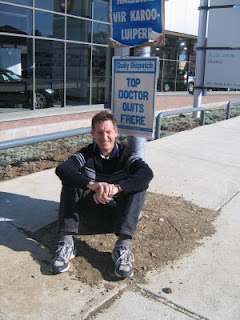
The scenery coming into

The scenery coming into

Saying goodbye is not easy; Jeanne-Marie’s lacrimal gland worked harder in the 5 days leading up to us leaving than in the previous 5 years! Some of the more moist occasions:
I don’t know how we’d have coped if we had to have another farewell to Jeanne-Marie’s family; we’ll be seeing Mark’s family in the
The children each had their own farewells arranged by some of their friends. The Taylors, Carters, Tebbuts and Hounsells were all there for us. People have been wonderfully supportive. None more so that Brian and Teresa Breetske, who lent us their car for 2 weeks prior to us leaving, cooked meals for us, put us up in their house, took us to the airport and did innumerable other things for us.
Thanks to all of you.

We hope that opportunities for them will be better overseas. SA is still a very polarised society – in terms of race and gender; on a personal level, we’re very kind and friendly, but on a societal level, we’re mean and violent. Our travels have shown us that there’re places where societies live harmoniously – in fact, it’s more the norm than the exception. Societal cohesiveness is not possible where there are such great disparities as exist in SA.
Violence is often cited as the reason for people leaving. Yes, it is there, in abundance. It hasn’t changed much in the last 10 years and those of us who are privileged, can cocoon ourselves reasonably well from it. There are many murders, rapes and assaults; but what about the 12 000 people who die on our roads each year? And the
On the medical front, we’ve seen huge advances – no more measles, (initially) less gastroenteritis and malnutrition – since the ANC took over. But this has all been negated by AIDS. AIDS denialists should just spend a day with us in a hospital; I hadn’t come across a case of AIDS prior to my leaving for
Antiretrovirals have made a huge impact on the lives of those with AIDS. Chronically sick, wasted people with ongoing diarrhoea and tuberculosis, regain their weight and become well. I had the misfortune of having to take ARVs for a month over Christmas 2006 after sticking myself accidentally with a needle after taking blood from a child with AIDS and cancer; after a few weeks I felt awful, and stopped a few days before the month was up. In our department of about 12 doctors, we’d have one or two who would need ARVs every 6 months. The risks of contracting AIDS without ARVs in this situation are in fact very low, but significant.
On the political front, we’re much better off now than we were in 1990. I cannot get too upset anymore about a possible Zumu presidency. Sure, there’s lots of corruption and nepotism, but probably no more than before. At leadership levels, the ANC have some very capable people in position; it’s at the bureaucratic level that things fall down completely. Working with the incompetence of many officials is very frustrating. This is not likely to improve anytime soon.
Education is still pretty good in the ex-model C schools, but abysmal in the township schools. It was very telling that during the recent teachers strike, the teaching continued in the good schools, and was non-existent in the poor schools. Some performance related pay scales are urgently required; this will not sit well with the unions though!
Having said all this, SA has been our home; we do not want to leave. Our families have been here for centuries, our roots are here, not in
We asked our children if we were doing the right thing.
“Yes,” said Chloe, “because of Education, Crime and AIDS”
“50-50,” said Gabi, “I’m going to miss my friends”